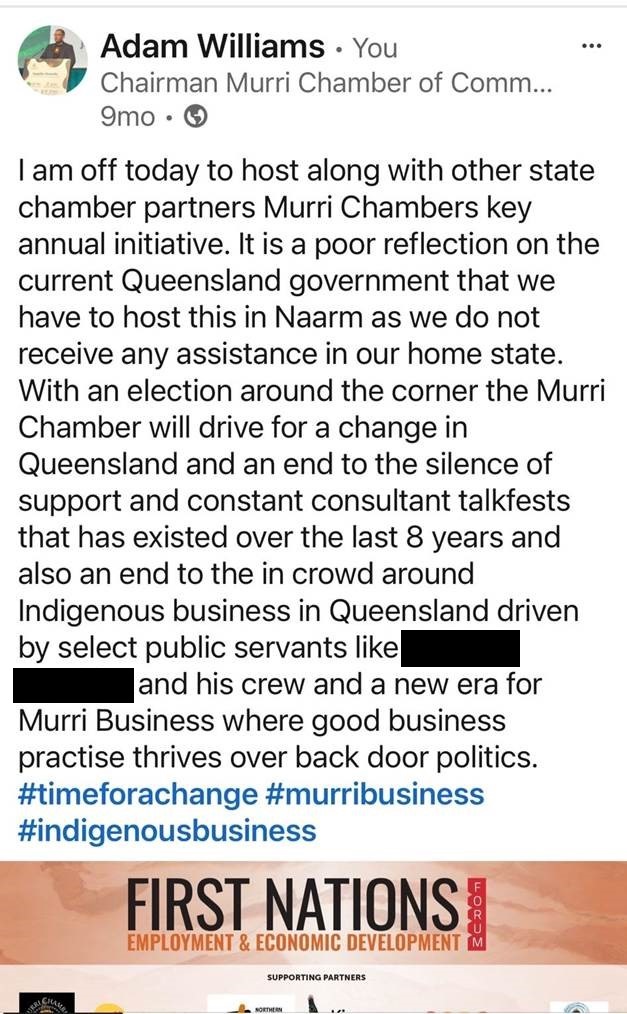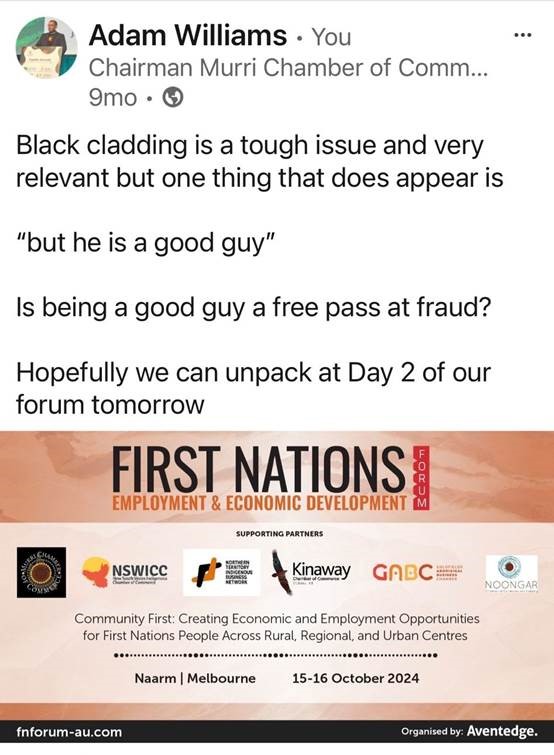One of Australia's largest Indigenous business certifiers is facing allegations of censorship and internal bullying.
Supply Nation is described by the federal government as the nation's "leading database of verified Indigenous businesses". One business owner told the Indigenous Business Review that without Supply Nation certification, it was "almost impossible" to work with certain suppliers, who treat the certification as essential.
Some businesses allege they have lost Supply Nation certification unfairly — with devastating consequences, even for 100 per cent First Nations-owned companies.
Adam Williams, Director of Bunji Enterprises and Chair of the Murri Chamber of Commerce, says his one of his businesses was stripped of certification after he made several social media comments, including criticising the then-Queensland Government on his personal LinkedIn page.

In a letter to Mr Williams, seen by the Indigenous Business Review, Supply Nation CEO Kate Russell wrote: "In our view, the comments in your LinkedIn posts risk negatively impacting the reputation of Supply Nation and undermining the integrity of Supply Nation's network, which Bunji Enterprises is a part of."
Supply Nation cited its Code of Conduct, which requires members to "support the integrity and reputation of Supply Nation" and avoid behaviour that could negatively impact it. Bunji was barred from attending Supply Nation events for 12 months.
Mr Williams says he has never been told which post or posts breached their guidelines.
He also alleges he was later accused of having a criminal history and was denied a right of reply.
"The absence of any meaningful right of reply reveals an organisation operating with the transparency of a closed-door boardroom," he said.
"Hardly the democratic principles they claim to champion."

Presented with questions around businesses losing certification over social media posts without having a hearing or other formal opportunity to defend themselves, Supply Nation said the assertions were "incorrect", adding, they would "welcome evidence to support... (the) assertions".
"All Supply Nation Members and Suppliers are required to comply with a Code of Conduct. This Code of Conduct is publicly available and clearly stated on our website including what constitutes non-compliance," the spokesperson said.
"Our Code of Conduct and T&C's are publicly available, including the process for Members and Suppliers to appeal a decision. We have adhered to these and will adhere to privacy and confidentiality obligations regarding specific instances."
Mr Williams says his business has survived due to strong personal networks and name. He notes, however, that some corporations have refused to work with him without Supply Nation certification — even while acknowledging his company's reputation.
"What we're witnessing is less a professional standards body and more a theatrical performance; one that would be amusing if the stakes weren't so high for genuine Indigenous businesses," he said.
On its website, Supply Nation lists its values as integrity, accountability, collaboration, excellence and empowerment.
Mr Williams says those values ring hollow.
"For an organisation preaching Indigenous empowerment, their actions suggest they've mastered the art of colonial gatekeeping better than their predecessors," he said.
"One might reasonably ask: where exactly did professionalism and integrity go to die in their organisation chart?"
"A toxic environment"
Documents and email threads reviewed by the Indigenous Business Review from former and current Supply Nation employees include allegations that when concerns about certifications were raised, senior staff responded with what the employees allege constituted bullying and intimidation.
One former employee, tasked with certifying businesses, said they were 'given' the choice to resign with a favourable reference from Supply Nation, or face being shut out of the sector after highlighting oversight failures.
"It's bullying and harassment," they alleged, speaking on condition of anonymity.
"It is a toxic environment."
The Indigenous Business Review put a number of questions to Supply Nation regarding the accusations. In response to claims of bullying, a Supply Nation spokesperson said they had a Code of Conduct guiding employee behaviour.
"There is also a transparent process for resolving grievances should they occur," they said, adding that if there was "credible evidence to support these accusations, we welcome an opportunity to assess and decide on appropriate action".
To combat "Black cladding" — where non-Indigenous entities exploit Indigenous businesses to gain unfair access to procurement contracts — Supply Nation certifies First Nations businesses as being at least 51 per cent Indigenous-owned, managed, and controlled.
Businesses certified by Supply Nation can use the body's logo; a credential often viewed by corporate Australia as a seal of authenticity. Supply Nation has become one of the most influential certifiers in the country.
However, one whistleblower said they have fears that some applicants can fabricate websites or forge documents to appear Indigenous.
"No one does site visits," they said.
"You can go to a job site and you look at the vehicles coming in and out. They're not Indigenous [owned] vehicles. So, what happens is, you get 'Black washing.'"
A former Supply Nation employee shared documents with the Indigenous Business Review which showed they had raised concerns about two companies which met the requirements for certification but were, in their view, both engaged in Black-cladding. One company was largely managed by its non-Indigenous 49 per cent owner, and the other appeared, in the former staff member's view, to be a front for a larger non-Indigenous company. Both companies are currently certified and listed on the Supply Nation database.
Some whistleblowers claim certification is a "numbers game" to attract corporate membership fees.
"What's the point? We're not closing the gap. We're just enabling people to game the system; to keep money," one said.
The new allegations have emerged in the shadow of controversy surrounding Supply Nation's recent Leadership Roundtable, which included no Indigenous businesses, but did include weapons manufacturers.
There is also tension from some of the local and regional Indigenous chambers of commerce, who are understood to believe they have been excluded from some of the funding and influence given to Supply Nation.
Supply Nation defends their processes
The Supply Nation spokesperson said they "stand behind" their process, and note all businesses must meet the required criteria to be certified with Supply Nation.
"Businesses are also audited regularly to account for changes in shareholding and company structure," the spokesperson said.
"If the business does not meet the criteria, they are provided advice to this effect and removed from the national directory – Indigenous Business Direct."
They added Supply Nation works with "authorised Indigenous organisations such as Aboriginal Land Councils to verify Indigeneity".
"We work with them to confirm documents are authentic. Under Federal Government requirements, Indigeneity is confirmed/verified by authorised Indigenous organisations, not Supply Nation."
Liberal Senator and Opposition spokesperson for Indigenous Australians, Kerrynne Liddle, last month cautioned against over-reliance on Supply Nation.
"There is a greater and different role for Indigenous Chambers of Commerce and much to learn from the two-thirds of Indigenous businesses not registered with Supply Nation; we don't engage these SMEs (small and medium enterprises) nearly enough," she said.
Editor's note: An earlier version of this report incorrectly stated that Supply Nation certification requires a fee. There is no fee for certifying suppliers.



